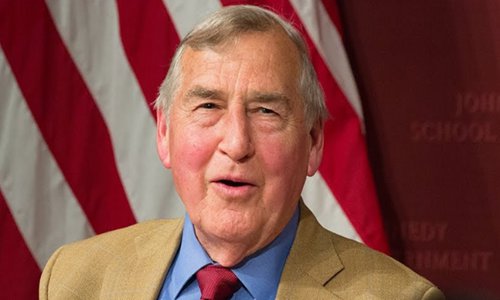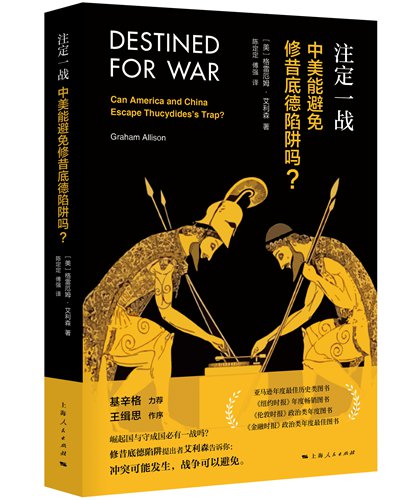
Editor's Note:
When history proves a war between Beijing and Washington is seemingly inevitable, what should we do? What is happening exactly between the two powers, which seem to be locked in a rivalry? What is US leaders' attitude toward the historical lessons of clashes between rising and established powers? Will the US learn to accept China getting strong eventually? Graham Allison (Allison), Douglas Dillon Professor of Government at Harvard University, who coined the term "Thucydides Trap," shared his views on these issues in an exclusive interview with Global Times (GT) reporter Li Aixin.
GT: A few days ago in Shanghai, you were quoted commenting on the Meng Wanzhou case that "things get worse before they get worse." Could you please elaborate on that?
Allison: The first thing to understand about what's happening in the relationship between the US and China is that the overall relationship is driven by a Thucydidean dynamic, in which a rising China is impacting a ruling US, with all of the natural and predictable consequences of that.
China is feeling bigger and stronger and feeling constrained or contained by America. America, which is accustomed to ruling, is feeling disrupted and disturbed by a rising China. If that's the case, this competition then spreads across the whole relationship.
Especially now that the American government has concluded that China is no longer a strategic partner, but a strategic adversary, it is pushing back against China in every space. It means to. It is trying to organize the ability to. So we see this in trade conflict, in constrained investments, in the competition for technology, in each arena. This is just another example of an underlying phenomenon.
GT: Some observers say this unexpected episode could lead to a cold war between China and the US, what's your take on this?
Allison: Again, to put it in context, US Vice President Pence gave a speech in October that said the US will now fight back against China in every dimension except bombs and bullets in a new cold war. According to Pence, it is a cold war that China has already been waging against the US for 25 years, except the Americans didn't notice. He said the Trump administration has awakened to the fact that the cold war is happening now, what's new is that Americans will be fighting back in every dimension except bombs and bullets. That's why he calls it cold war, Cold War 2.0.
In that regard, Huawei, which has become China's champion for telecommunication and internet backbones, and the biggest supplier of telecom and internet equipment in the world, the bigger smartphone maker than Apple, is being very successful.
But Huawei has pretty tight relationships with Chinese intelligence, so the Americans say. If Huawei has installed the basic infrastructure of a nation's internet and telecommunication equipment, that makes it easier for China to spy on that system, that's what the Americans say. So the Americans are pushing back against Huawei.
You can see that in each one of the so-called Five Eyes, the five countries that share intelligence with each other - the US, the UK, Australia, New Zealand, Canada - they are excluding Huawei from their major suppliers. In Britain this is especially painful right now, because Huawei is a big supplier of telecommunication in Britain. This is just another arena of the struggle.
The move, the arrest of the CFO, surprises me. I don't know the details. I know what people have said, but it also looks to me to be more complicated than that. Until I know more of the facts, I can't say exactly about that. But I think that's another illustration of what happens. If you and I are strategic adversaries and we are fighting back in every dimension, then we should expect things like that.
GT: We are seeing a 90-day trade truce between Beijing and Washington. What do you think is the chance to reach an agreement before the deadline?
Allison: Nobody knows. But my bet is that because the Chinese government very much wants to reach an agreement and is working very hard, and because President Trump wants to have a success, I think it's likely that there will be an agreement of some sort. Either the truce will be extended further or the tariffs will be adapted or adjusted, I would say more likely than not they would have a temporary victory. But my longer-term bet is, the issues will re-arise and will continue getting worse for the foreseeable future.
Unless both the US and China find a way to a new strategic rationale for the relationship, a new form of great power relationship, so we were talking, some big new ideas, that things will get worse.
GT: As you mentioned in the book, Destined for War: Can America and China Escape Thucydides's Trap, Chinese president is familiar with Thucydides' trap and showed his willingness to learn from history, what are US leaders' attitude, especially President Trump, to the theory?
Allison: I cannot say with any confidence about President Trump because I don't know him and have never talked to him about this. But I can say James Mattis, US secretary of defense, big student of Thucydides, is very knowledgeable about Thucydides Trap, very concerned about what the consequences could be. So, for sure, he understands it very well. Mike Pompeo, the secretary of State, again, I've talked to him many times about it. He understands it very well and is very serious about it. The chairman of the Joint Chiefs of Staff, Joseph Dunford is very thoughtful about this. Matt Pottinger, who is the person at National Security Council responsible for the China account, understands it very well. I think the Trump administration is very well informed about the possibilities.
President Trump is not a great reader of history. But he does have survival instincts. I would hope that the basic ideas are sinking in. But I don't know that yet.
GT: Over the past two years, ties between China and the US have been like riding on a roller coaster. What caused so many twists and turns in so short a time? Is Thucydides' Trap the answer to it?
Allison: The roller coaster goes up and down, Thucydides' Trap is not addressing that part. The Thucydidean dynamic tells you the slope of the relationship - it gets worse before it gets worse.
The reality is, I am getting bigger and stronger and you are feeling me pressing against you. Then the perception and misperception by both of us exaggerates, and then the emotions and fear make things even worse. Then the political struggle within each of the rising power and the ruling power means that people who were struggling with each other for power inside have a tendency to exaggerate the other. All this makes a very wicked brew that can make things worse.
At the same time, people look and say, "Wait, where this is happening." So occasionally you get a moment where people are thinking, this trade war will be a disaster for everybody, let's stop it. So the roller coaster goes up for a little bit. But then it comes back down a little bit. So the worrying (factor) in the Thucydidean dynamic is the slope of deterioration, not the perturbation of ups and downs as you go.
GT: You said Pence described China as a strategic adversary. Does this term represent mainstream view among US strategic circles and scholars?
Allison: Unfortunately, yes. I think this is a very unsatisfactory summary.
Trump is not the exception in the political class now. Across the board, Democrats and Republicans see China as the strategic adversary. In the policy surround in the universities and think tanks, especially for the people that study China, many of them feel like they were duped, or that they thought China was going to become a responsible stakeholder that was going to take its place in the America-led international order. And lo and behold, China wants to be China.
I believe, as I write in my book, this earlier belief was na?ve. I quote Lee Kuan Yew on this. He said, as China gets bigger and stronger, China will want to be China and accepted as such, not as an honorary member of the West.
Americans were thinking China will follow the footsteps of Japan and Germany, it will open itself, it will become richer, it will have a middle class, middle class would demand political rights, therefore it will democratize, and then, it will be peaceful and take its place in the America-led order. You can see what Japan and Germany did. Maybe that was idealistic, well, certainly naive.
Chinese have thought that China was a great society forever, for a thousand years except for this temporary interruption for the last couple of hundred years, when Europeans with technologies showed up to exploit us. But we are going to recover and become China again, make China great again. That's very understandable I think. And that's why the Thucydidean dynamic… is not idiosyncratic, this is not personally motivated. This is the dynamic of the reality of the situation.
But in the American policy community, you can see people beating themselves, ok, I will be tougher on China than the next person. I think this is not healthy. Because it doesn't help you have clear eyes to see the reality.
GT: You suggested that the US should learn to accept China getting strong. But for the moment, the US seems to have shown no sign of willingness to do so, how long do you think it would take before the US accepts it? Or will the US accept it at all?
Allison: The reality is, unless China goes off on some other trajectory, and I think it's not likely that it will, China will inevitably get bigger and stronger. That's just life. And as I quote Lee Kuan Yew in the book, he says look, Americans will not like this, because Americans are accustomed to be No. 1 in everything. So this will be very painful. He said it will be especially painful for Americans because of a small, poor, miserable people they looked down on become big and strong. So this will take a long time. But ultimately Americans are very pragmatic.
It will be also very painful for Chinese for not being impatient. I would say it will take some hard work both by Chinese and Americans to adjust. The fact is life is hard, it's not supposed to be easy. That's why I think we should have all Americans and Chinese do very serious thinking about how can we escape the Thucydides Trap, and we should be very imaginative, so that's why I am hopeful.

Destined for War: Can America and China Escape Thucydides's Trap?
